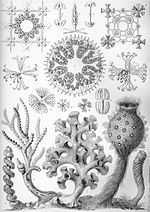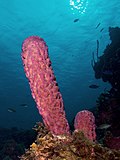Hexactinellid sponges are sponges with a skeleton made of four- and/or six-pointed siliceous spicules, often referred to as glass sponges. They are usually...
20 KB (2,304 words) - 15:07, 8 October 2024
reefs produced by sea sponges. All modern sponge reefs are formed by hexactinellid sponges, which have an endoskeleton made of silica spicules and are...
20 KB (2,450 words) - 08:18, 25 August 2024
(2007). "Hierarchical assembly of the siliceous skeletal lattice of the hexactinellid sponge Euplectella aspergillum". Journal of Structural Biology. 158...
132 KB (13,366 words) - 21:15, 29 October 2024
bubbles to burrow traces. The most accepted identity is that they are hexactinellid sponges, based on observed spicules, ostia, and internal structure....
3 KB (298 words) - 22:57, 8 May 2024
February 2013). "Recruitment, Growth and Mortality of an Antarctic Hexactinellid Sponge, Anoxycalyx joubini". PLOS ONE. 8 (2): e56939. doi:10.1371/journal...
2 KB (254 words) - 06:12, 27 March 2024
these sponges, more research has been done on its class, Hexactinellid sponges. Hexactinellids in the Pacific ocean form reefs on the sea floor many of...
16 KB (1,768 words) - 04:05, 19 September 2024
individuals of this species were found to be closely associated with hexactinellid sponges, and it was thus named after Patrick as a reference to the character's...
301 KB (25,766 words) - 03:49, 19 November 2024
nuda and Rossella racovitzae, Rossella antarctica is one of the main hexactinellid sponges that comprise the bulk of Antarctic benthic biomass. Consequently...
8 KB (810 words) - 12:30, 5 January 2023
All known specimens of A. patricki were found closely associated with hexactinellid sponges, and the species was thus named after the character Patrick...
49 KB (4,763 words) - 15:23, 9 November 2024
2020. All known specimens of the species were observed attached to hexactinellid sponges, indicating a close, possibly commensal, relationship between...
3 KB (319 words) - 00:26, 18 October 2024
from the maternal circulation into the embryo. Much of the body of Hexactinellid sponges is composed of syncitial tissue. This allows them to form their...
18 KB (2,049 words) - 04:36, 11 November 2024
reefs off British Columbia, Canada, reefs formed by sponges of the Hexactinellid family. The project was started in 1999, following the discovery of...
759 bytes (75 words) - 19:19, 22 April 2018
calcareous sponges do not exceed 10 cm (3.9 in) tall.[citation needed] Hexactinellid sponges (Hexactinellida) A relatively common species, Rhabdocalyptus...
169 KB (16,654 words) - 05:13, 22 November 2024
ludwigi Cambroernid, global distribution Lenica L. unica, L. rigbyi Hexactinellid sponge Archiasterella A. sp Chancellorid Wapkia W. petila Protomonaxonid...
5 KB (140 words) - 11:09, 6 November 2024
Aphrocallistidae is a family of hexactinellid sponges in the order Sceptrulophora. There are two genera in Aphrocallistidae. Aphrocallistes Gray, 1858...
2 KB (175 words) - 19:11, 12 July 2021
from the Marjum Formation of Utah documents the Cambrian origin of the hexactinellid body plan". Royal Society Open Science. 11 (9). 231845. Bibcode:2024RSOS...
344 KB (31,240 words) - 19:38, 22 November 2024
Conlan, Kathy (2013). "Recruitment, Growth and Mortality of an Antarctic Hexactinellid Sponge, Anoxycalyx joubini". PLOS ONE. 8 (2): e56939. Bibcode:2013PLoSO...
66 KB (6,839 words) - 00:23, 6 August 2024
Leocratides is a genus of marine hesionid polychaete worms dwelling in hexactinellid sponges. A superseded synonym of the genus is Leocrates. Its parent...
6 KB (653 words) - 00:11, 18 October 2024
Madrepora oculata have been described.: 2 Also found are Demosponge and Hexactinellid sponges, sea lilies, and sea cucumbers: 2 In all at least 309 species...
11 KB (1,362 words) - 18:26, 14 November 2024
refers to the hooked anterior legs. The species is associated with hexactinellid sponges. It is found in waters of the coasts of New Zealand and Australia...
1 KB (127 words) - 00:23, 20 December 2023
Siliceous sponges Hexactinellid spicule Scientific classification Domain: Eukaryota Kingdom: Animalia Phylum: Porifera Clade: Silicispongia Schmidt, 1862...
3 KB (345 words) - 01:33, 21 October 2023
Monorhaphis is a monotypic genus of siliceous deep sea Hexactinellid sponges. The single species is the type species Monorhaphis chuni, a sponge known...
4 KB (382 words) - 07:39, 19 April 2024
sponge-grade organisms from the Ediacaran Period. Originally interpreted as a hexactinellid sponge, the organism also bears some coelomate characteristics, including...
5 KB (404 words) - 20:11, 31 May 2024
"Valdivia" (1898-1899), Schulze described the largest known siliceous hexactinellid sponge, the up to three metres high Monorhaphis chuni. This sponge develops...
71 KB (7,846 words) - 15:12, 2 November 2024
skêptron - "sceptre" and -φόρος, -phóros - "bearing") is an order of hexactinellid sponges (glass sponges). They are characterized by sceptrules, a type...
7 KB (737 words) - 16:55, 13 February 2024
crustaceans and worms. The only known fossil, found alongside various Hexactinellid sponges, graptolites, and nautiloids in deep-water shale, known as the...
2 KB (171 words) - 14:56, 22 November 2024
syncytium. This multinucleated syncytium is the major tissue component of Hexactinellid sponges. Glass sponge reefs are known for having the highest grazing...
9 KB (973 words) - 15:59, 10 September 2024
the Coral Sea at depths of 350 metres (1,150 ft), in association with hexactinellid sponges. A. J. Bruce (1988). "Bannereus anomalus, new genus, new species...
829 bytes (59 words) - 16:10, 6 January 2024
Wisseneschaften . München 13(1): 1-63. Okada, Y. (1925). On an Interesting Hexactinellid, Calyptorete ijimae nov. gen. et nov. sp. Annotationes zoologicae japonenses...
4 KB (388 words) - 20:01, 20 March 2023
2007). "Hierarchical assembly of the siliceous skeletal lattice of the hexactinellid sponge Euplectella aspergillum". Journal of Structural Biology. 158...
100 KB (10,352 words) - 00:23, 15 November 2024
















